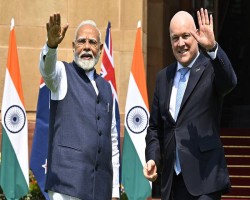SSC Current Affairs
TABLE OF CONTENTS |
| International Relations |
|---|
|
|
|
Why in News?
Prime Minister Narendra Modi and New Zealand Prime Minister Christopher Luxon held talks in New Delhi on Monday, focusing on strengthening bilateral ties, particularly in defence, security, and trade. The two leaders emphasized the need to institutionalize defence cooperation and address shared challenges such as global terrorism and maritime security. Key Highlights of the Meeting Defence and Security Collaboration India and New Zealand agreed to strengthen and institutionalize defence and security ties. A roadmap for bilateral defence industry collaboration will be developed, including joint exercises, training, and port visits. Both countries are working together in the Combined Task Force-150 for maritime security in the Indian Ocean. Counter-Terrorism Cooperation PM Modi highlighted the shared experiences of India and New Zealand in combating terrorism, referencing the 26/11 Mumbai attacks and the 2019 Christchurch attacks. India raised concerns about pro-Khalistan activists in New Zealand, urging action against anti-India elements misusing democratic freedoms. Trade and Economic Ties Discussions on a Free Trade Agreement (FTA) were initiated to boost bilateral trade and investment. Cooperation in sectors like dairy, food processing, and pharmaceuticals was emphasized. Diplomatic and Cultural Ties New Zealand announced plans to expand its diplomatic presence in India by over 60%. The two countries will celebrate 100 years of sporting relations in 2026. Geopolitical Shifts At the Raisina Dialogue, PM Luxon highlighted three key geopolitical shifts: The decline of the rules-based international order. Security considerations driving national policies over economic priorities. A shift from efficient supply chains to protectionism and resilient supply chains with trusted partners. Key Highlights of India-New Zealand Partnership Defence and Maritime Cooperation Both nations agreed to institutionalize their defense and security collaboration. Plans to develop a roadmap for bilateral defense industry cooperation. India and New Zealand jointly operate in the Combined Task Force-150, focusing on maritime security in the Indian Ocean. India reaffirmed its stance on development over expansionism and emphasized cooperation in counterterrorism efforts. Economic and Trade Relations Both nations initiated discussions on a mutually beneficial Free Trade Agreement (FTA). Focus on boosting trade and investment in dairy, food processing, and pharmaceuticals. Strengthening bilateral economic ties, acknowledging India's role as New Zealand’s largest source of skilled migrants and second-largest source of international students. Countering Terrorism and Extremism India raised concerns about pro-Khalistan activities in New Zealand, particularly online "referendums" advocating for a separate Sikh homeland. New Zealand assured continued cooperation and responsiveness to India’s security concerns. Both nations recalled their joint fight against global terrorism, referencing Mumbai 26/11 attacks and the Christchurch terror attack of 2019. Cultural and Diplomatic Engagement Announcement of centenary celebrations of India-New Zealand sporting relations in 2026. New Zealand to expand its diplomatic presence in India by 60%, signifying deeper bilateral engagement. PM Luxon acknowledged the 300,000-strong Kiwi-Indian community, highlighting their contribution to New Zealand’s economy and society. Challenges in India-New Zealand Relations Pro-Khalistan Activities Pro-Khalistan elements in New Zealand have been active, pushing for an online “referendum” for a separate Sikh homeland. India has urged New Zealand to address the misuse of democratic freedoms by anti-India groups. Trade Barriers Despite the potential for growth, bilateral trade remains below its potential due to non-tariff barriers and limited market access. Geopolitical Alignments New Zealand’s strategic focus on the Pacific region and its alignment with Western powers sometimes diverge from India’s priorities in the Indo-Pacific. Way Forward Enhancing Defence Collaboration Develop a comprehensive roadmap for joint defence production and technology sharing. Increase participation in multilateral maritime security initiatives. Boosting Trade and Investment Expedite negotiations on the FTA to unlock the full potential of bilateral trade. Promote investments in sectors like agriculture, renewable energy, and technology. Addressing Security Concerns Strengthen intelligence-sharing mechanisms to counter terrorism and extremism. Address India’s concerns regarding pro-Khalistan activities in New Zealand. Cultural and People-to-People Ties Leverage the Indian diaspora in New Zealand to deepen cultural and economic ties. Celebrate the centenary of sporting relations in 2026 to strengthen cultural exchanges. Do You Know? India is New Zealand’s 11th largest trading partner, with bilateral trade valued at $2.5 billion in 2023. New Zealand has no Quad ambitions, but aligns with Australia, Japan, and South Korea on regional security issues. Conclusion The meeting between PM Modi and PM Luxon marks a significant step in strengthening India-New Zealand relations. By institutionalizing defence and security ties, addressing shared challenges, and boosting economic cooperation, the two countries are poised to build a robust partnership in the Indo-Pacific and beyond. The focus on counter-terrorism, trade, and cultural exchanges underscores the multifaceted nature of this relationship, which holds immense potential for mutual growth and collaboration. |
|
<< 17-Mar-25
|
|
|
